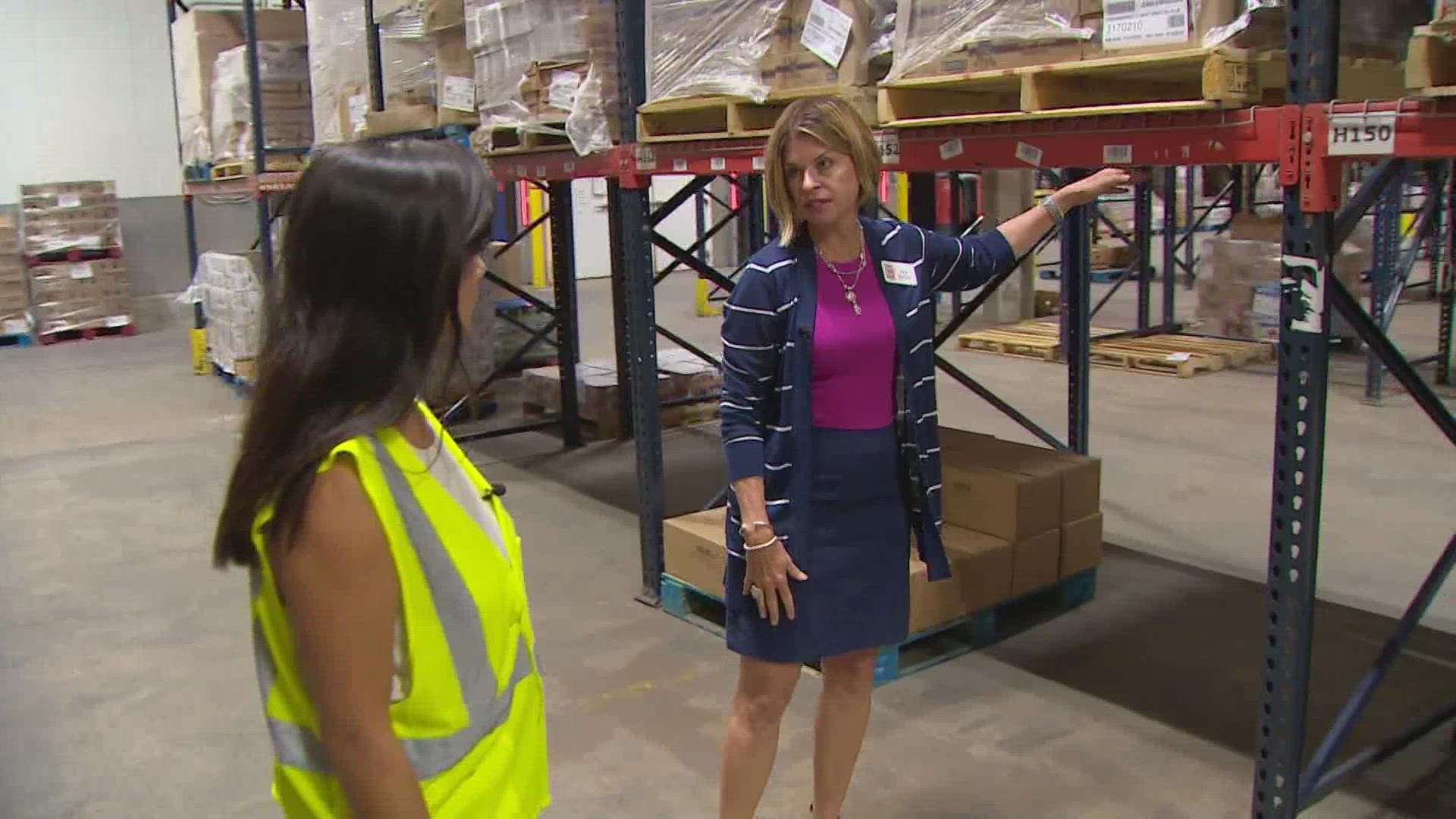FORT WORTH, Texas — A North Texas nonprofit organization is struggling to find the funds necessary to support its partners and citizens around its area as leaders say they are now "facing a crisis."
The Tarrant Area Food Bank is now facing a shortage in dollars to support its mobile distributions and over 400 agency partners, as leaders say the need for their services have surged to levels they haven't seen since the height of the COVID-19 pandemic.
To meet this need, the food bank said it is having to purchase food from the food industry with unbudgeted funds. This means the nonprofit now must decide to fundraise in the community or begin shutting down mobile distribution centers.
A little more than a week ago, food distribution events offered by the Tarrant Area Food Bank at Dickies Arena and other locations were greeted with what organizers referred to as "mid-pandemic crowds."
“Our shelves in the distribution center at the Tarrant Area Food Bank would normally be much fuller,” said Julie Butner, President and CEO of the Tarrant Area Food Bank. “We are facing a food shortage that we did not see coming, given food supply chain issues, food donations are down, food costs are sky high and the need is even greater as inflation and other problems are having a negative effect on our community. We need support from our community: donations to purchase food and volunteers to ensure its delivery”
RELATED: 'The need is really high': Thousands of families given food at distribution events in Fort Worth
Hunger increases during the summer because of children’s lack of access to school feeding programs, according to the Tarrant Area Food Bank. On top of this seasonal increase, inflation is hurting families' budgets. With grocery prices now running at nearly 12% over the previous year and wages not keeping pace, the North Texas nonprofit said lines at its food distribution centers are growing quickly.
Working-class families are disproportionately affected by food prices as 33% of their household budgets go to groceries even in more stable cost environments, the Tarrant Area Food Bank said.
During May, the nonprofit's weekly distribution was right around 800,000 meals a week, which it said is down from one million during most of the pandemic. Now, that number has risen above one million.
The Tarrant Area Food Bank's response has been hampered by these specific supply chain issues:
- The U.S. Department of Agriculture (USDA) has wound up its emergency pandemic commodity supply program to food banks
- The for-profit food industry cannot source food in sufficient amounts for its supply chain, reducing the amount of overage that would typically be donated to food banks
To meet the challenges between supply and demand, the Tarrant Area Food Bank has had to purchase food in record amounts, far in excess of what was budgeted. To date, the North Texas nonprofit has purchased $4.9 million of food against an allotted year-to-date budget of $1.4 million. The food bank's costs have also increased with rises in electricity, diesel, equipment leases, and other standard operational expenses.
More food distributed also requires more volunteers, who play a critical role in ensuring food is distributed. The need for volunteers is critical this week for the food bank's weekly Herman Clark Wednesday night distribution. This is also the case for the Farmers Market Nutrition Programs and the weekly Friday distribution at Birdville ISD. All opportunities to volunteer can be found at www.tafb.org/volunteer.
North Texas Food Bank faces similar needs
“The supply chain certainly impacts our access to donated food right now. Therefore, we’re purchasing three times more food than we ever have,” North Texas Food Bank President and CEO Trisha Cunningham said.
Before the pandemic, the North Texas Food Bank told WFAA it provided access to roughly 7.3 million meals on average per month.
Last month? NTFB said it did more than 13 million.
“We’re also seeing another perfect storm where we’re seeing the increase of food needs, but our donations have also gone down,” Cunningham said.
Also, kids are on summer break, which only adds to the community’s food needs.
“Summer’s the hungriest time of the year. Most families are having to provide 10 extra meals per child of school age that they didn’t have to provide during the school year,” Cunningham said.
Click here to donate or volunteer with the North Texas Food Bank.

